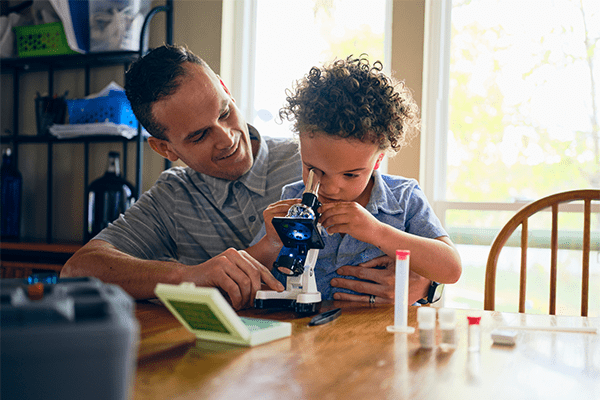8 Affirmations for Co-Parents
How positive affirmations work and why co-parents can benefit from them.
- 5 min read
- health & wellness

Experiencing moments of self-doubt or discouragement is common for many people. Challenges in your professional and personal life can often negatively impact your ability to think of yourself in a positive light. For co-parents, the additional struggles that come with shared parenting can significantly affect their mental health and well-being if left unaddressed.
One approach that can offer many benefits is using words of affirmation. Whether your current stress is from co-parenting or another source, using affirmations can be a powerful tool in addressing your concerns and refocusing on a positive outlook. Learn how affirmations can help boost your mental health, confidence, and overall well-being.
What are affirmations?
Affirmations, sometimes called mantras, are phrases or statements meant to combat unhelpful thoughts or feelings. While it’s more common to say positive affirmations aloud to yourself, writing them down or displaying them in visible locations is another way to incorporate them. When repeated consistently, words of affirmation can help you build your self-confidence by challenging internal and external negativity. Just as you would speak words of encouragement to a friend or loved one, affirmations turn those efforts inward so you can better motivate yourself.
Do affirmations really work?
Talking to yourself can seem silly initially, but the power of positive affirmations is backed by decades of research as social psychologists began studying it in the 1980s. The foundation of affirmations is based on self-affirmation theory, which the American Psychological Association defines as the concept that people are “motivated to maintain views of themselves as well-adapted, moral, competent, stable, and able to control important outcomes.” When a person’s sense of self is questioned, they can experience low self-esteem and other negative feelings.
Self-affirmation theory operates on the assumption that these three statements are true:
- In times of threat, people maintain their sense of self by defending it from outside conflicting information.
- People respond to threats in one domain by affirming their self-worth in other areas.
- A person’s core values play an essential role in maintaining their sense of self.

What are the benefits of using affirmations?
By consistently implementing affirmations in daily life, people often improve their outlook on life and overall well-being. The repetitive, routine nature of words of affirmation does more than help your emotional health—it directly impacts your brain. In a study published in 2016, researchers found that participants who used positive affirmations activated the reward centers in their brains. With this connection between affirmations and rewarding feelings, using them consistently can improve your mental health and ability to think more positively.
In an article from Psychology Today, Dr. David Bredehoft shares that various studies on affirmations have found that participants experienced beneficial effects on aspects like their:
- Self-control
- Academic achievement
- Happiness
- Motivation
- Self-esteem
What are some helpful affirmations for co-parents?
Stress can come from sharing custody with your ex or even parenting your children, so it’s essential to identify these stressors and find ways to combat them. With so many benefits, implementing positive affirmations can be a beneficial tool for co-parents who could use a mental health boost. Here are 8 affirmations you can incorporate into your daily routine to help reframe your thoughts throughout your shared parenting journey.
1. Co-parenting has ups and downs that I can handle.
It’s no secret that being a co-parent can seem like riding a rollercoaster of emotions. Working with your ex to co-parent your children isn’t always easy after a divorce or separation, and your situation may never really improve if you experience an especially contentious split or are in a high-conflict situation. Regardless of your circumstances, it’s important to remind yourself that you are more than capable of tackling whatever comes your way.

2. I’m doing my best for my kids, and that’s enough.
While you may strive to be a perfect parent, it’s not something that your kids demand from you. When you feel like you’ve been a bad parent to your kids, you need to remind yourself that you’re doing what you can to be there for them. Being present and involved is better than trying and failing to achieve perfection, and you should set more realistic goals to avoid feeling like you’re not doing enough.
3. I can only control myself, not my ex.
Even if you and your ex have a peaceful co-parenting dynamic, there will be times when their actions or words upset you. Whether it’s unintentionally forgetting to communicate changes or intentionally harassing you, your ex will do things you wish they did differently. Your ex’s choices and mistakes are theirs and theirs alone. While you can’t control how they act, you can control how you respond.
4. Being frustrated doesn’t make me a bad parent.
Feeling frustrated with a person or situation is completely normal, and co-parents are no exception to these emotions. Whether it’s something your kids or their other parent does, you’ll sometimes be frustrated with them and may feel guilty for having these feelings. Parenting is not a frustration-free experience, and feeling this way does not make you any less of a good parent.

5. What works for other parents may not work for me.
Parents are often caught in a vicious cycle of comparing themselves to other parents. You probably think you need to do better for your kids after seeing other parents share their stories on social media or hearing them in your friend groups, but comparing yourself to others can be a damaging exercise. Even though others succeed with different methods, you know your kids best and do what you can to support and provide for them.
6. I deserve love, happiness, and respect.
Regardless of the part your ex plays in your life, it’s vital to remember that you deserve good things. Your past mistakes do not define you as a person or deem you unworthy of kindness, and you shouldn’t accept lower standards. You deserve to be loved by friends and family, feel happiness, and be treated with respect, and you should keep your mind and heart open to these things.
7. My health matters as much as my kid’s health.
As a parent, your innate drive to put your kids above all else can be challenging to suppress. In caring for your kids, you probably prioritize their physical and mental health over your own. While it’s great to care for your kids, taking care of yourself is critical to being the parent your kids need. Remind yourself that your health is just as important and deserving of care when you’re feeling down.
8. I will ask for help, and that makes me strong.
Parents are expected to be superheroes in their personal and professional lives, but even a superhero sometimes needs a sidekick or partner. There’s a stigma around adults asking for help being seen as a sign of weakness, but knowing when to seek assistance is a sign of great strength and self-awareness. Whether you wish to work with a mediator, mental health professional, or attorney, knowing when to ask for help is essential.
Affirmations can be an incredible asset in your co-parenting situation. When combined with a communication service like TalkingParents, affirmations can equip you with the mindset needed to manage shared parenting. Once you set your affirmations, you can write them in your Personal Journal and reference them when communicating and collaborating with your co-parent. If you want to take it a step further, you can use your Journal to support your mental health by starting an affirmation journal to elaborate on how each positive phrase makes you feel. By actively improving and protecting your well-being through affirmations and organized co-parenting tools, you can create a better shared parenting dynamic that helps you focus on being there for your kids.